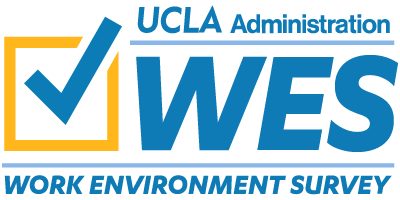UCLA Administration is dedicated in providing the best work environment for its employees. A comprehensive survey (full-length) is conducted every other year supplemented with a brief “Pulse” survey offered in the off years. This process allows the organization to identify areas of development and to implement changes over a two year time period to maximize planning improvement processes.
The purpose of the comprehensive (full-length) Work Environment Survey is to ensure we are operating in a “High Performance Workforce Model.” Based on over 50 years of research and statistically validated measures, the model includes many of the components measured in the comprehensive Work Environment Survey.

This process enables our clients to:
- Check-in on the progress resulting from actions taken since the last Work Environment Survey
- Receive feedback on priority areas within the organization
- Obtain insights that can help management make course directions to drive organizational improvement efforts before the full-length Work Environment Survey
Please contact your OED People Research and Performance Consultant for assistance:
- Joanne Chang at jchang@oed.ucla.edu
- Christopher DeMaci at cdemaci@oed.ucla.edu
